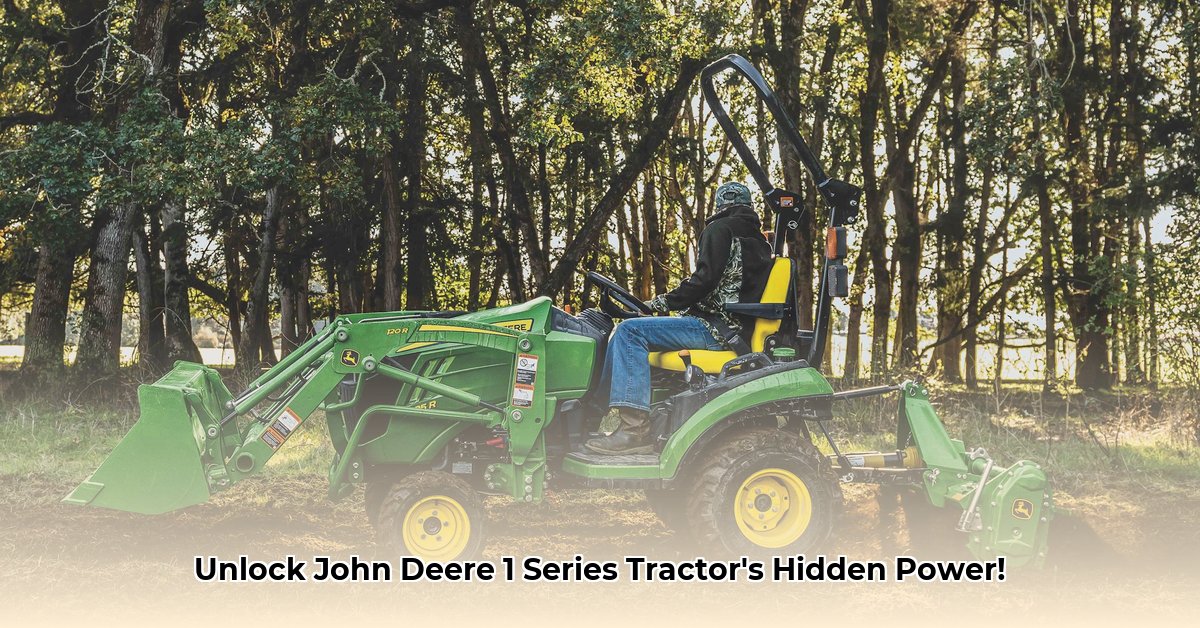
John Deere 1 Series Tractors: A Review for Sustainable Agriculture
The John Deere 1 Series tractors represent a compelling option for small-scale farmers, landowners, and those prioritizing sustainable agricultural practices. These compact tractors offer a blend of power, maneuverability, and efficiency, making them suitable for a variety of tasks while minimizing environmental impact. This review delves into their key features, performance, sustainability aspects, and overall value proposition.
Key Features & Specifications: Power and Precision in a Compact Package
John Deere 1 Series tractors are designed for efficiency and ease of use. Engine options provide sufficient power for various applications, ranging from mowing and tilling to light hauling. Fuel efficiency is a key design element, a crucial factor for sustainable farming. Transmissions vary by model, offering both hydrostatic (infinitely variable) and gear-driven options, allowing users to choose the transmission best suited to their needs and preferred operating style. The intuitive controls contribute to ease of use, minimizing learning curves for new users. The AutoConnect system streamlines implement changes, maximizing productivity. The inclusion of features like power steering, four-wheel drive (on select models), and excellent maneuverability boosts efficiency in various farming and landscaping applications.
Engine Power and Fuel Efficiency:
Engine horsepower varies by model, ranging from approximately [Insert HP Range Here]. While precise fuel efficiency figures depend heavily on the specific model, terrain, and tasks, the 1 Series is generally known for its relative fuel economy compared to larger tractors. This contributes significantly to reduced operating costs and a lower carbon footprint.
Transmission Options and Ease of Use:
Hydrostatic transmissions offer seamless speed adjustments, beneficial for precise operations. Gear-driven transmissions provide durability and reliable power transmission for more demanding tasks. Regardless of the transmission type chosen, the 1 Series tractors are designed for intuitive operation.
Performance & Usability: Real-World Applications and Efficiency Gains
The compact design of the John Deere 1 Series is a significant advantage. Its maneuverability excels in confined spaces, making it ideal for orchards, vineyards, and smaller fields. This agility reduces the risk of soil compaction, promoting healthier soil and contributing to long-term soil health. The four-wheel-drive option further enhances traction, ensuring consistent performance even on uneven or wet terrain.
"The maneuverability of the 1 Series is a game-changer for our orchard," says Sarah Miller, owner of Miller Family Orchards. "We can easily navigate between rows, minimizing crop damage and maximizing efficiency."
The versatility of compatible implements is another notable strength. From tillers and mowers to loaders and backhoes, a single 1 Series tractor can handle many tasks, reducing the need for multiple pieces of equipment and associated storage space. This minimizes the overall environmental impact and operating costs.
Sustainability Aspects: Minimizing Environmental Impact
The John Deere 1 Series directly contributes to sustainable farming through several key features:
Reduced Soil Compaction: The smaller size significantly minimizes soil compaction compared to larger tractors, promoting better water infiltration, aeration, and overall soil health. This leads to healthier crops and reduced erosion.
Fuel Efficiency: As previously mentioned, the relative fuel efficiency of the 1 Series translates to lower fuel consumption and reduced greenhouse gas emissions compared to larger tractors performing similar tasks.
Versatile Implements: The ability to perform multiple tasks with a single machine reduces the need for additional equipment, minimizing manufacturing emissions and fuel consumption.
However, comprehensive long-term data on the environmental impact is still being gathered. Further research is necessary to fully quantify potential reductions in emissions and overall environmental footprint. While initial findings are promising, ongoing analysis of fuel consumption across diverse conditions and tasks is still underway.
Cost & Value: A Balanced Assessment of Investment
The initial purchase price of a John Deere 1 Series tractor is a factor to consider. However, the long-term value proposition often outweighs the upfront cost. Reduced labor needs, increased productivity, and minimized soil damage can significantly improve the return on investment (ROI) over the tractor's lifespan. Maintenance costs should also be factored into the overall budget.
While the initial cost can seem high, many farmers report a strong ROI due to increased efficiency and reduced labor costs. The durability and longevity of these tractors further enhance their value.
Pros and Cons: A Balanced Perspective
Pros:
- Excellent maneuverability and compact size
- Relative fuel efficiency
- Wide range of compatible implements
- Ease of use and intuitive controls
- Reduced soil compaction
Cons:
- Limited lift capacity compared to larger tractors
- Potential high initial purchase price
- Insufficient power for extremely heavy-duty tasks
Conclusion: A Strong Contender for Sustainable Agriculture
The John Deere 1 Series tractors offer a compelling package for small-scale farmers and landowners seeking sustainable and efficient solutions. Their maneuverability, fuel efficiency, and versatile implement compatibility contribute to both economic and environmental benefits. While further data is needed for a complete assessment of long-term environmental impact, the current evidence strongly suggests that the 1 Series is a strong contender in the sustainable agriculture equipment landscape. A thorough assessment of individual needs and budget remains crucial before making a final purchasing decision.